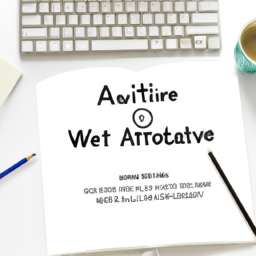Unlock The Secret to Crafting the Perfect Author Website A Step-By-Step Guide
How To Create An Author Website
Starting a website for yourself as an author in the 21st century should be a priority. For all authors, it is a great way to showcase your work, connect with readers, and potentially get more visibility for yourself in the industry. Creating an author website is easy enough, and if this is something you are interested in, then this article will provide an exhaustive exploration into the 8-12 pivotal themes that will make up the foundation of your site:
1. Logo and Branding.
To kick off your website, decide on a logo and a brand aesthetic that will act as recognizable staples of your website. This is the face of your author identity. Choose elements such as fonts, a color palette, photo style, and design effects that will be consistent across your website. This type of personalization will also extend to your social media channels, ensuring that everything is consistent for your readers and potential buyers.
History and Milestones
It is important to be mindful of the history and milestones that have shaped your author website. To that, you can look back and see how much your idea has grown from the early 2000s to now. Consider the trend in minimalistic designs, the influence of user experience, and the expectation of a professional appearance on an author platform.
Popular Trends and Pitfalls
It is useful to research the latest popular trends for author websites. Look into the existing offerings in your genre of writing to understand industry standards and find inspiration for how your site can stand out. At the same time, you must be mindful of potential pitfalls or drawbacks. Common pitfalls can include too much reliance on stock images, over complication of the website design, not dedicating enough effort to proof-reading, or not incorporating visuals properly.
2. Content Strategy
Once your design and branding aspects are taken care of, you can start focusing on the content of the website. The type of content you feature on your website, how often it is updated, and the value that it provides to readers will determine the success and appeal of your website. For example, if you decide to share writing tips or insights that will help your audience, then chances are you'll leave a lasting imprint.
Understanding Your Writing Demographic
It is important to understand the demographics of your writing and what your readers will be looking for. Maybe the readers that come to your website are budding authors who are looking to hone their craft or maybe your readers are already established in the industry and are looking for updates on your new books and projects. Knowing this information will better inform you on what type of content you can share.
SEO and Social Media Integration
Aside from tactics such as updating content regularly and having potential search terms in place, you must consider how you will be engaging with readers on social media such as Twitter, Facebook, and Instagram. Your website should be connected with your profiles so that readers can move easily back and forth between your website and your other platforms. Additionally, for further reach and engagement, you may want to consider leveraging SEO techniques such as optimizing meta tag titles and description, writing keyword-rich blog posts, adding the appropriate alt tags to your images and videos, and internal linking.
3. Website Layout, Navigation, and User Experience
The layout of your website should be designed with readers in mind. An effective website structure is essential for readers to find and view relevant information quickly and easily. Think about what sections are most important - whether it is your portfolio, your blog or your "About Me" page - and organize them accordingly. An easy and user-friendly navigation structure will allow readers to explore your website without feeling lost. Additionally, your user experience must be at the forefront of design considerations as readers will appreciate having a hassle-free and seamless experience.
Responsive Web Design
Responsive web design is also important. This will ensure that your website can be easily accessed from any device, so don't forget to include features such as mobile navigation for smaller devices and the ability to resize fonts and layout to fit any screen size.
Theming and Modularity
Themes and modules are also useful factors to take into account. Themes may give your website a professional and modern look and feel, and having a modularity to your website ensures that features and content can be sectioned off for easier management.
Insights
Creating an author website is ultimately about turning your platform into something that will be valuable and memorable to readers. Knowing and understanding the 8-12 pivotal themes such as branding, content strategy, website layout, navigation, and user experience will be instrumental in creating an enjoyable platform for your readers. It is always a good idea to stay up to date with the trends in the industry but be sure to have your own unique style and visuals. And of course, don't forget the importance of SEO and incorporating social media.
Closing Remarks
Creating an author website is an exciting and liberating project. With all the resources available these days, having your very own website for your written work isn't just a dream. This article provided an exhaustive exploration of 8-12 pivotal themes that will make up the foundation of your website. With these themes in mind, now you can go ahead and create an author website that is entirely your own.
.

